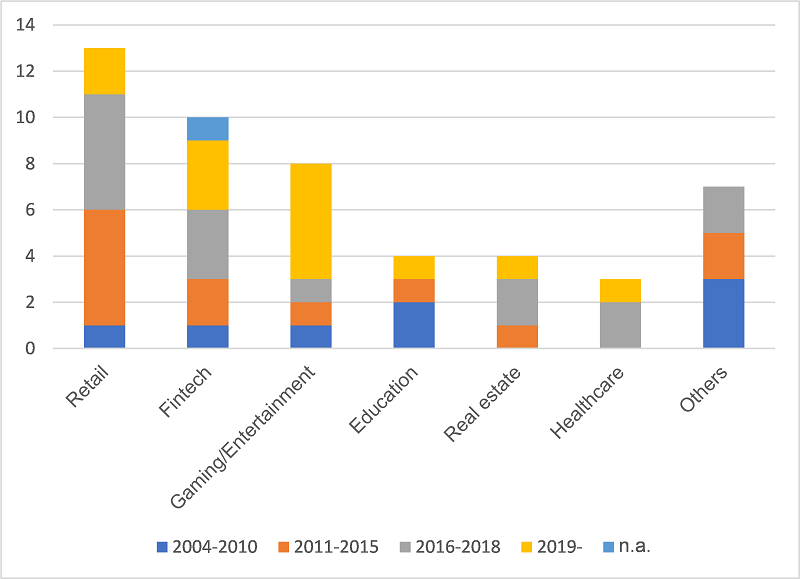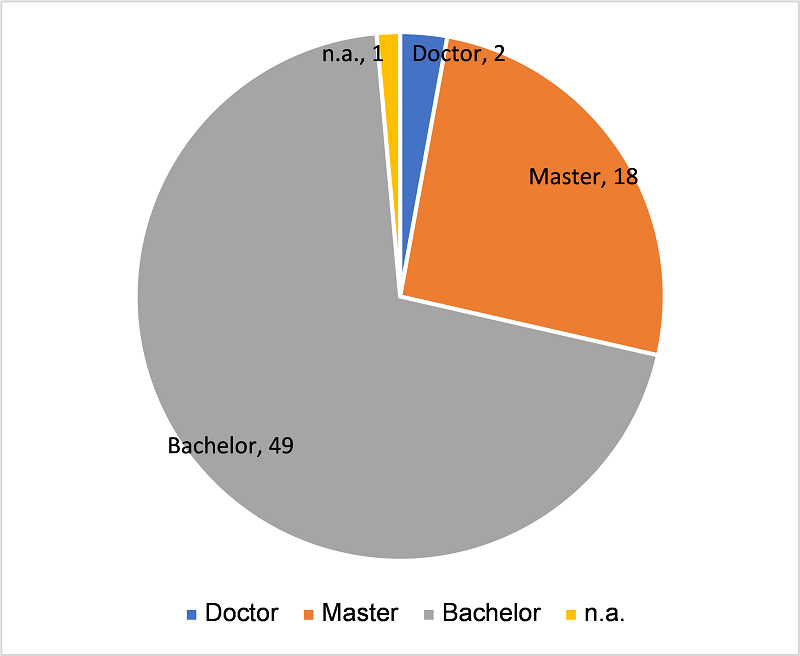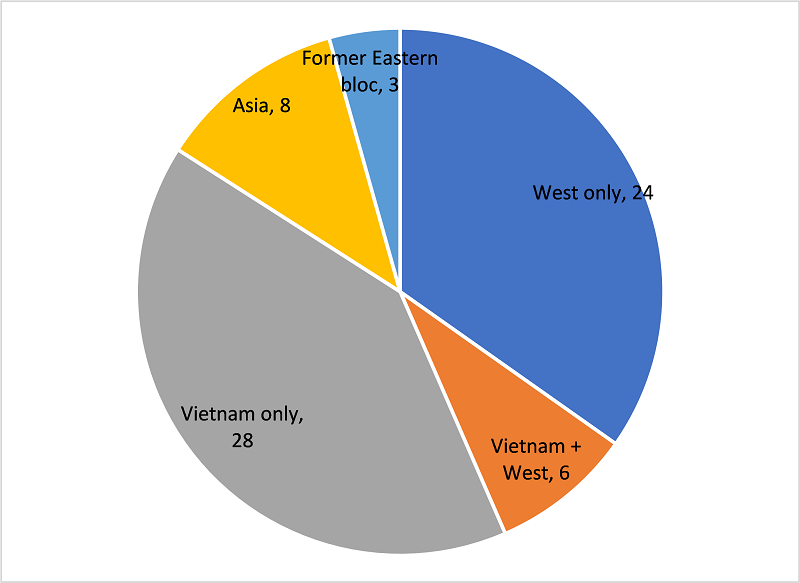IDE Research Columns
Column
Rise of Digital Service Providers in Vietnam: Global and Local Factors Beyond Knowledge?

Mai FUJITA
Institute of Developing Economies, JETRO
January 2025
As digitalization transforms global economic activities, some developing countries are witnessing an increase in homegrown entrepreneurs who leverage technology to address local needs and challenges. Although studies have emphasized the critical role of “returnee entrepreneurs” equipped with the technology and business models acquired abroad, local knowledge and connections are also essential for managing a business. Fujita (2024) uses Vietnam as a case study to show how global influences and local dynamics together impact the emergence of domestic players in digital services.
Digital Economy and New Entrepreneurship
The digital revolution has spawned new technology-driven services, ranging from e-commerce and ride-hailing to online education and healthcare. With the widespread use of smartphones and internet access, such services have rapidly expanded in developed and developing parts of the world. Against this backdrop, a notable trend can be observed in some developing countries: the rise of homegrown entrepreneurs, with emerging “tech hubs” such as India’s Bangalore or Kenya’s Nairobi attracting investments from venture capitals abroad.
Earlier studies indicate that successful entrepreneurs often have a common background: they are often individuals who have returned from advanced countries, particularly the US (Kenney et al. 2013; Klingler-Vidra et al. 2021). The development of digital services requires intensive use of intangible assets such as business models, technology, and software. Naturally, returnees may be inclined to apply their knowledge and first-hand experience gained in Silicon Valley or other global tech hubs in their home countries, where there is growing demand for digital services. Given that tangible assets such as factories and retail outlets are less crucial in this sector, the typical barriers that new businesses face in developing countries, such as limited access to land or construction permits, are much less likely to pose major constraints.
Digital Service Providers in Vietnam: The Diversity of Players
When examining the rise of digital service providers, Vietnam proves to be an interesting case study. In this country with just over 100 million people, global tech giants and major regional players as well as domestic companies are vying for market opportunities.
One notable trend is the emergence of start-ups. Figure 1 shows that companies attracting most equity investments are those offering several digital services mainly to the domestic market. Old market entrants dating back to the early 2010s can be found primarily in the retail sector, such as e-commerce, and in education. The entry into sectors such as fintech, gaming and entertainment, and real estate has accelerated, especially after 2019, when Vietnam adopted a major policy to promote digital transformation.1 The COVID-19 pandemic also triggered the widespread adoption of various digital services.

Figure 1. Digital Service Companies that Attracted the Most Equity Investment by Sector and Year of Establishment (Number of Companies)
Note: The figure shows the top 49 companies headquartered in Vietnam providing digital services,
ranked by the amount of total equity investment as of November 2022.
Source: Prepared by the author with data extracted from Crunchbase.
However, start-ups are not the only domestic players. Reputable domestic companies, such as large private information technology (IT) companies and state-owned telecom groups, have established subsidiaries to offer various digital solutions and services to the domestic market. These companies focus particularly on e-government and smart city projects, attempting to capitalize on the increased demand resulting from the government’s digital transformation policies.
Start-ups: Who Are the Founders?
When examining the rise of digital service providers, Vietnam proves to be an interesting case study. In this country with just over 100 million people, global tech giants and major regional players as well as domestic companies are vying for market opportunities.
Let us now examine the profiles of start-up founders. The analysis includes 70 Vietnamese people who founded the 49 start-ups discussed earlier. The average age of the founders, estimated from their year of university graduation, was 36 as of 2022. Most had only earned a bachelor’s degree, while a small number had a master’s or doctoral degree (Figure 2-(a)). Consistent with the literature, the sample included a significant number (30) of founders who attended universities in Western countries (Figure 2-(b)). However, it is notable that majority of the founders do not fall in this category. Twenty-eight founders studied exclusively at domestic universities. Moreover, six of those who obtained degrees in Western countries also attended universities in Vietnam. Among 24 founders who studied exclusively in Western countries, 21 also had work experience in Vietnam before starting their respective businesses.

(a) Highest Degrees Held

(b) Place of Higher Education
Figure 2. Educational Level of the Founders ( Number of People)
Note: The figures show the data for 70 Vietnamese founders of the 49 companies shown in Figure 1.
“West” includes North America, Western Europe, and Oceania.
Source: Database constructed by the author based on Crunchbase, company websites,
LinkedIn, and other online sources.
Well-established domestic companies provided a breeding ground for young entrepreneurs. Notably, the Corporation for Financing and Promoting Technology (FPT), Vietnam’s largest private IT company, played a pivotal role. Founded in the late 1980s, the company not only built IT-related services, such as software development, but also established a programming training center in 1999 and a university in 2006. Of the 70 start-up founders, 11 had previously worked for either FPT or its subsidiaries and 7 were trained at FPT-related educational institutions. Notably, the number of founders trained at FPT-related educational institutions (7) was higher than that of those who had studied at Hanoi University of Science and Technology (6), the traditional source of talent in natural sciences in the country.
In summary, a significant number of entrepreneurs returning from Western countries have education and/or experience in Vietnam. How can these findings be explained?
Cast Studies: Embracing Local Knowledge and Networks
While various factors may play a role, one possibility is that creation of new businesses, including digital services, requires local knowledge and/or connections, as suggested by a study on new technology ventures in China (Li et al. 2012). The following case studies of two entrepreneurs, drawn from qualitative interviews conducted by the author, imply that this factor may also apply to Vietnamese start-ups.
The first case portrays a founder of a start-up offering digitalized logistics solutions who has over 20 years of work experience in the domestic transportation industry and a master’s degree in supply chain management in the US. Learning about the business model in the US significantly motivated him to establish a business that addresses inefficiencies in the transportation sector. However, implementing these models required expertise in the domestic industry and extensive networks, such as organizing the team and developing a practical strategy to persuade shippers and transport companies to adopt the platform, thereby overcoming their initial reluctance to accept competition.
The second case involves an entrepreneur in the mobility sector. He was a computer science student at a domestic university and has won numerous awards in international programming competitions and developed a public bus map application. While the original intention was to offer consumer-oriented services, he encountered challenges in monetizing services for low-income users. Eventually, the company secured investment from a domestic private conglomerate. As a part of the conglomerate, the company is now offering services to government organizations, state-owned enterprises, and private corporations, including smart transportation management and port solutions.
These cases suggest that proficiency in technical skills or understanding of business models alone may be insufficient for managing businesses. In the former case, the founder’s familiarity with the local market and connections were crucial to build customer relationships. In the latter case, being part of a major domestic conglomerate may have facilitated business with domestic customers or government organizations.
Behind New Entrepreneurship: Interplay of Global and Local Factors
This study’s findings show the impact of global influences and local dynamics on Vietnam’s digital entrepreneurship. There is evidence of considerable global influence, as demonstrated by the emerging new cohort of private entrepreneurs leveraging technology, skills, and business models acquired from Western countries and securing foreign venture capital investments. However, local factors are also an integral part of the story. Most domestic players, including those discussed earlier, cater to domestic consumers, businesses, and government organizations. For these businesses to thrive, they must customize their products and services to meet local demands and customs, establish local networks of stakeholders, and navigate the complex regulatory environment. This has likely been driven by entrepreneurs and other talents with expertise in the country’s IT, telecommunications, and other related industries. The Vietnamese case suggests that despite digital transformation, understanding local nuances remains critical for comprehending the growth trajectories of new businesses.
Author’s Note:
This column is based on Mai Fujita. 2024. “Digital Service Firms in Vietnam: Who Are the Founders and How Are They Growing?” in Digitalization in Developing Countries: Cases from Africa, Southeast Asia, and Latin America, edited by Miki Hamada,133-159 (in Japanese). Chiba: Institute of Developing Economies.
Note:
- Resolution No.52 of the Politburo of the Communist Party of Vietnam on policies for active participation in the Fourth Industrial Revolution.
References
Kenney, Martin, Dan Breznitz, and Michael Murphree. 2013. “Coming Back Home after the Sun Rises: Returnee Entrepreneurs and Growth of High Tech Industries.” Research Policy 42(2): 391-407. https://doi.org/10.1016/j.respol.2012.08.001
Klingler-Vidra, Robyn, Tran Ba Linh, and Adam William Chalmers. 2021. “Transnational Experience and High-performing Entrepreneurs in Emerging Economies: Evidence from Vietnam.” Technology in Society (66). https://doi.org/10.1016/j.techsoc.2021.101605
Li, Haiyang, Yan Zhang, Yu Li, Li-An Zhou, and Weiying Zhang. 2012. “Returnees Versus Locals: Who Perform Better in China's Technology Entrepreneurship?” Strategic Entrepreneurship Journal 6(3): 257-272. https://doi.org/10.1002/sej.1139
* Thumbnail image: Motorcycle taxi drivers in Hanoi searching for customers on online platforms (photo by the author in July 2023)
** The views expressed in the columns are those of the author(s) and do not represent the views of IDE or the institutions to which the authors are attached.

